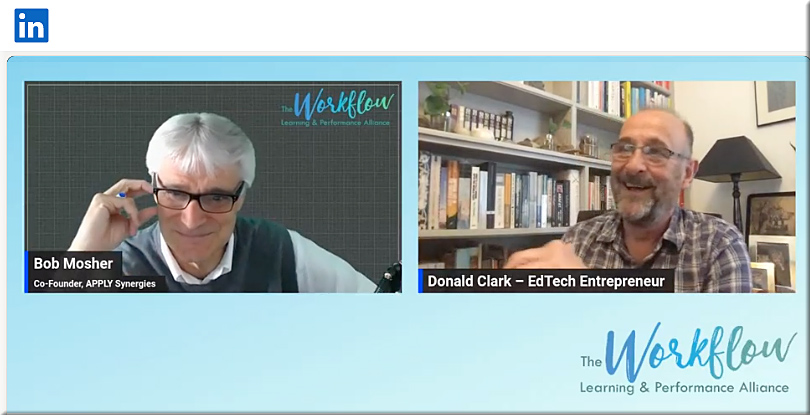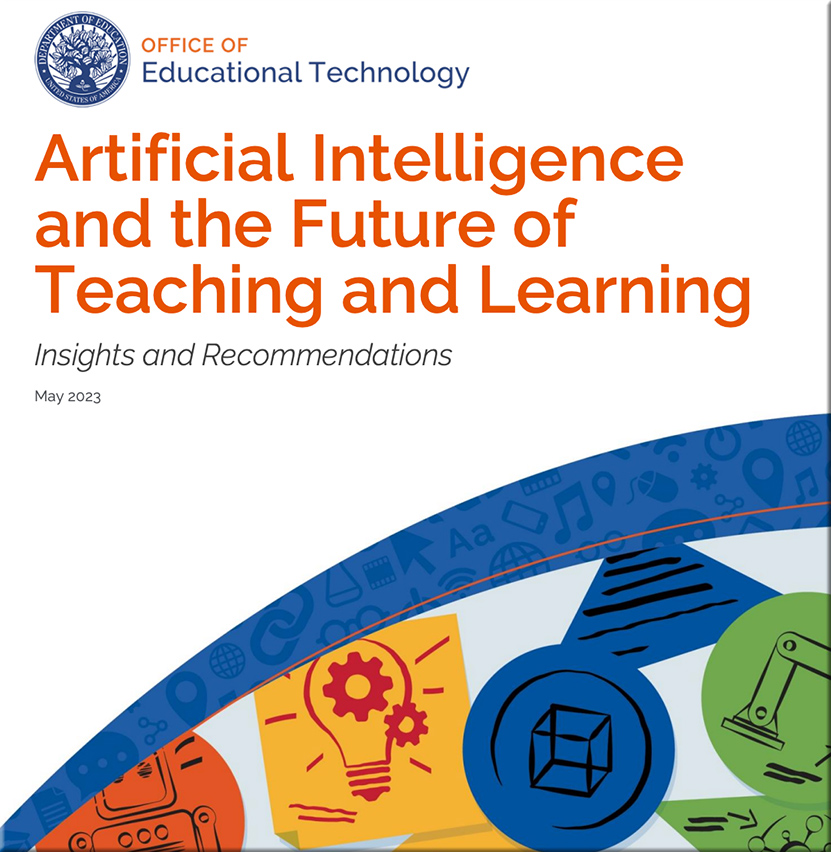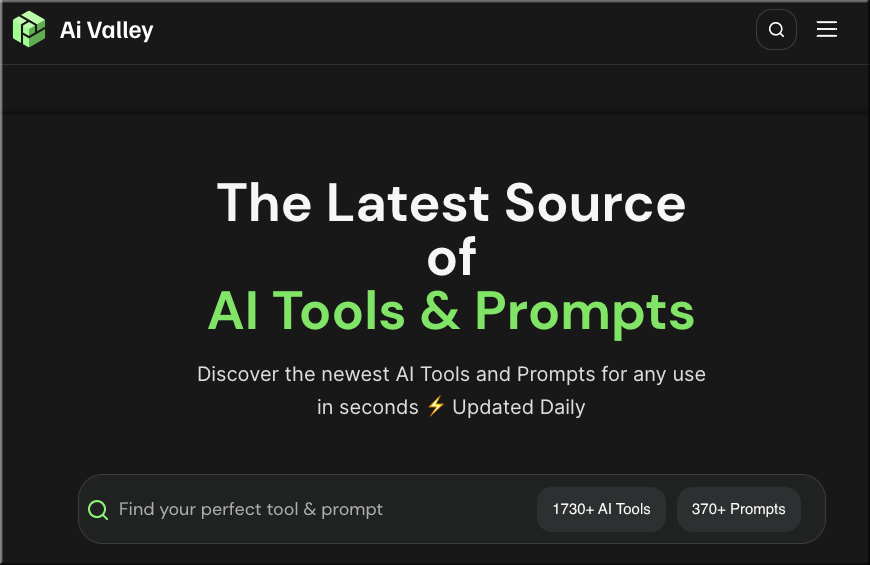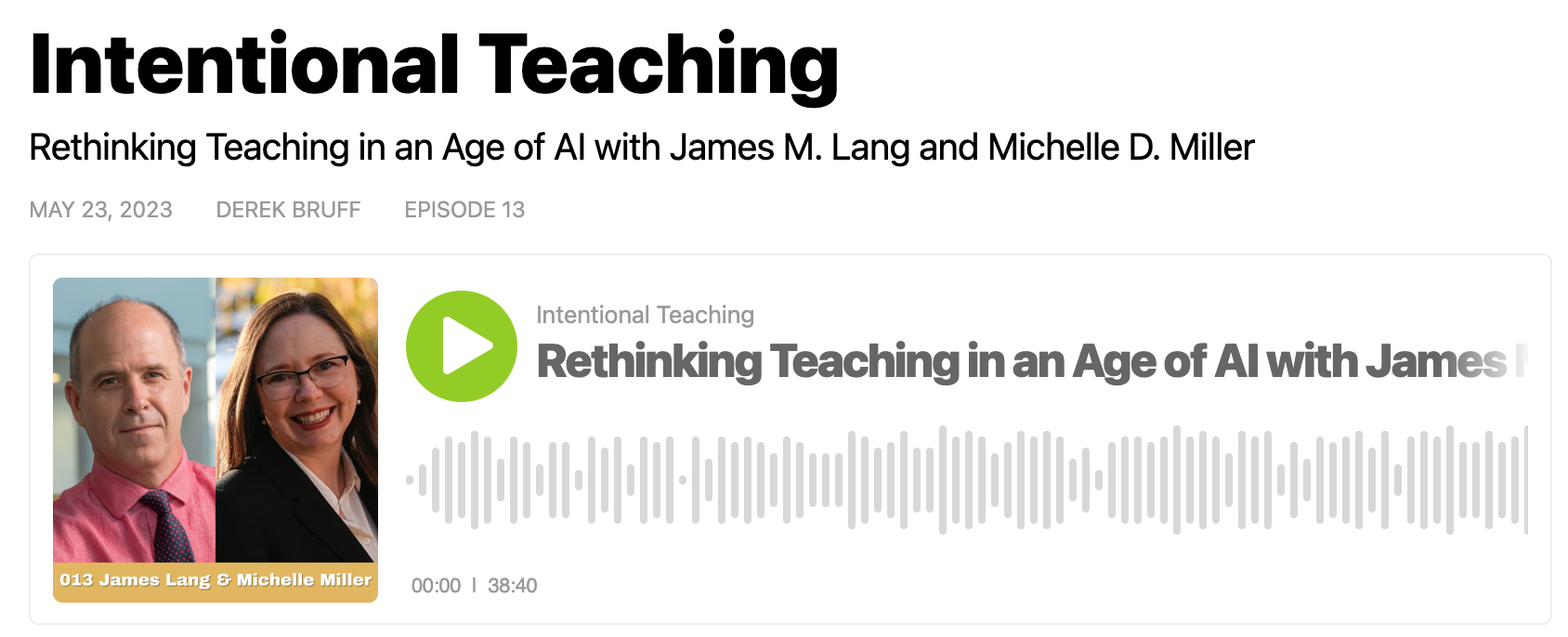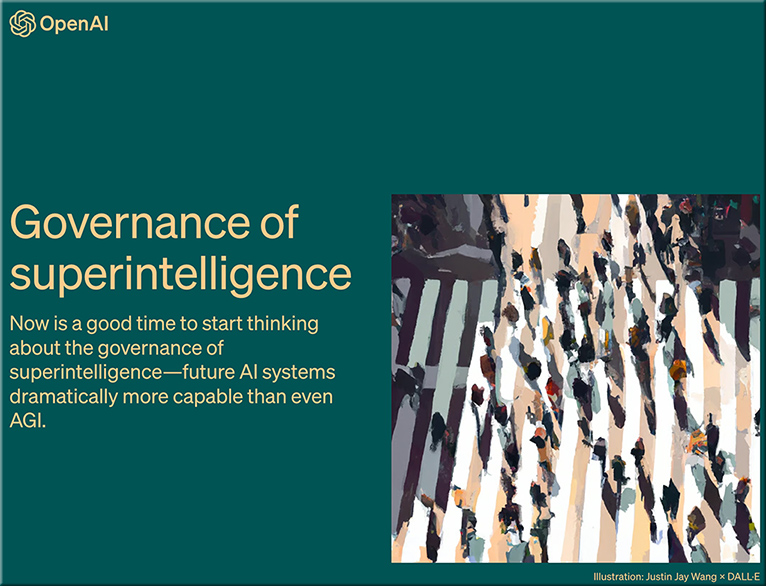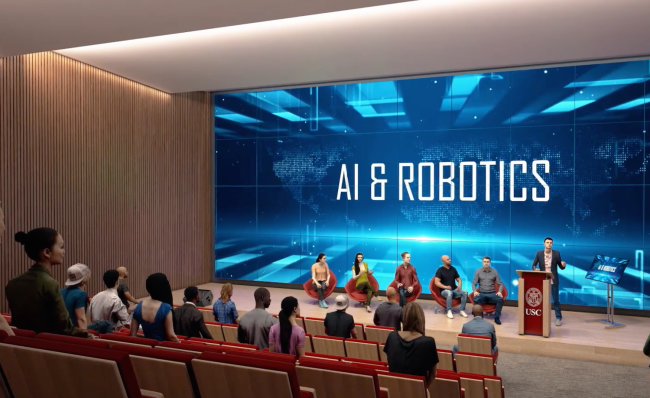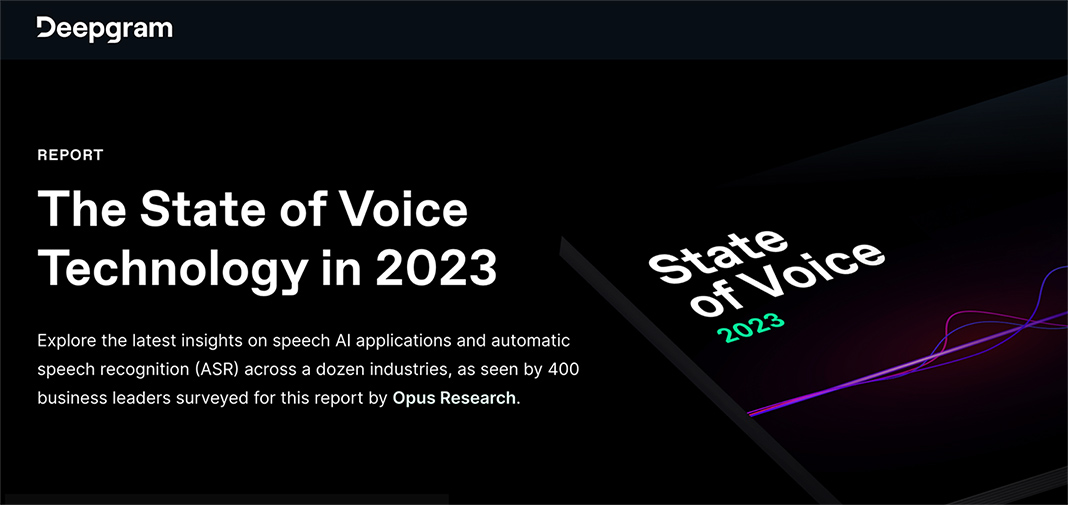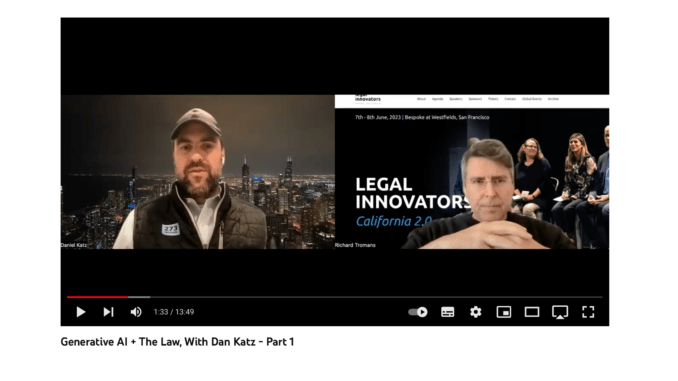RIP online job interviews.
This AI tool enables real-time transcriptions for your microphone input AND speaker output.
It then generates a response for the user to answer questions based on the live conversation: pic.twitter.com/ZzSkRtR0ol
— Rowan Cheung (@rowancheung) May 29, 2023
The perils of consulting an Electric Monk — from jordanfurlong.substack.com by Jordan Furlong
Don’t blame ChatGPT for the infamous incident of the made-up cases. And don’t be too hard on the lawyer, either. We’re all susceptible to a machine that tells us exactly what we want to hear.
Excerpt:
But then the “ChatGPT Lawyer” story happened, and all hell broke loose on LawTwitter and LawLinkedIn, and I felt I needed to make three points, one of which involves an extra-terrestrial robot.
My first two points are pretty straightforward:
- The tsunami of gleeful overreaction from lawyers on social media, urging bans on the use of ChatGPT and predicting prison time for the hapless practitioner, speaks not only to their fear and loathing of generative AI, but also to their desperate hope that it’s all really nothing but hype and won’t disturb their happy status quo. Good luck with that.
- The condemnation and mockery of the lawyer himself, who made a bad mistake but who’s been buried by an utterly disproportionate avalanche of derision, speaks to the lack of compassion in this profession, whose members should pray that their worst day as a lawyer never makes it to the front page of The New York Times. There but for the grace of God.
Are you looking for evidence to support the side that’s hired you? Or are you looking for the truth? Choosing the first option has never been easier. It’s also never been more dangerous.
As referenced topic-wise by Jordan above, also see:
A lawyer used ChatGPT to prepare a court filing. It went horribly awry. — from cbsnews.com by Megan Cerullo
What I learned at CLOC 2023 — from alexofftherecord.com by Alex Su
This week I attended the premier legal operations conference. Here’s what I heard.
Excerpt:
Theme 1: Generative AI isn’t going anywhere
This was a huge theme throughout the conference. Whether it was vendors announcing GPT integrations, or panels discussing how to use AI, there was just an enormous amount of attention on generative AI. I’m certainly no stranger to all this hype, but I’d always wondered if it was all from my Silicon Valley bubble. It wasn’t.
What was driving all this interest in AI? Well, the ubiquity of ChatGPT. Everyone’s talking about it and trying to figure out how to incorporate it into the business. And not just in the U.S. It’s a worldwide trend. Word on the street is that it’s a CEO-level priority. Everywhere. So naturally it trickles down to the legal department.
We need to talk about ChatGPT — from mnbar.org by Damien Riehl
Excerpt:
How well do LLMs perform on legal tasks?
Personal experience and anecdotal evidence indicate that LLMs’ current state provides impressive output in various legal tasks. Specifically, they provide extraordinary results on the following:
- Drafting counterarguments.
- Exploring client fact inquiries (e.g., “How did you lose money?”).
- Ideating voir dire questions (and rating responses).
- Summarizing statutes.
- Calculating works’ copyright expiration.
- Drafting privacy playbooks.
- Drafting motions to dismiss.
- Responding to cease-and-desist letters.
- Crafting decision trees.
- Creating chronologies.
- Drafting contracts.
- Extracting key elements from depositions.
Professors Plan Summer AI Upskilling, With or Without Support — from insidehighered.com by Susan D’Agostino
Academics seeking respite from the fire hose of AI information and hot takes launch summer workshops. But many of the grass-roots efforts fall short of meeting demand.
Excerpt:
In these summer faculty AI workshops, some plan to take their first tentative steps in redesigning assignments to recognize the AI-infused landscape. Others expect to evolve their in-progress teaching-with-AI practices. At some colleges, full-time staff will deliver the workshops or pay participants for professional development time. But some offerings are grassroots efforts delivered by faculty volunteers attended by participants on their own time. Even so, many worry that the efforts will fall short of meeting demand.
From DSC:
We aren’t used to this pace of change. It will take time for faculty members — as well as Instructional Designers, Instructional Technologists, Faculty Developers, Learning Experience Designers, Librarians, and others — to learn more about AI and its implications for teaching and learning. Faculty are learning. Staff are learning. Students are learning. Grace is needed. And faculty/staff modeling what it is to learn themselves is a good thing for students to see as well.
Also relevant/see:
It takes a village… Reflections on sustainable learning design — from The Educationalist (educationalist.substack.com) by Alexandra Mihai
Excerpts:
This can be done first and foremost through collaboration, bringing more people at the table, in a meaningful workflow, whereby they can make the best use of their expertise. Moreover, we need to take a step back and keep the big picture in mind, if we want to provide our students with a valuable experience.
…
This is all about creating and nurturing partnerships. Thinking in an inclusive way about who is at the table when we design our courses and our programmes and who we are currently missing. Generally speaking, the main actors involved should be: teaching staff, learning design professionals (under all their various names) and students. Yes, students. Although we are designing for their learning, they are all too often not part of the process.
In order to yield results, collaborative practice needs to be embedded in the institutional fabric, and this takes time. Building silos happens fast, breaking them is a long term process. Creating a culture of dialogue, with clear and replicable processes is key to making collaborative learning design work.
From DSC:
To me, Alexandra is addressing the topic of using teams to design, develop, and teach/offer courses. This is where a variety of skills and specialties can come together to produce an excellent learning experience. No one individual has all of the necessary skills — nor the necessary time. No way.
Webinars from Tom Barrett regarding AI for Education — a free webinar series
- Webinar 6 replay
- Miriam Scott – Head of Digital Education at Hillbrook Anglican School, Brisbane, Queensland, Australia.
- Laura Bain – Head of Emerging Technologies and Innovation, Matthew Flinders Anglican College, Sunshine Coast, Queensland, Australia.
- Nicole Dyson – Founder & CEO, Future Anything, Brisbane, Queensland, Australia.
- Webinar 5 replay
- In the fifth free webinar on AI for Education, I am joined by Dean Pearman, Head of Education at Beaconhills College and Tom Oliphant, Head of Technology and Enterprise at St John’s Grammar School. We explore questions about creativity, design and the new skills that are emerging. Join us to invest in your AI Literacy. Expand your toolset, broaden your understanding, and challenge your thinking.
- Webinar 4 replay
- You are watching the fourth free webinar, a dialogue about AI for education with Sophie Fenton, Steve Brophy and hosted by Tom Barrett Building Blocks – key AI concepts to learn. Practical frameworks for navigating the challenges of AI for education. Be part of a dialogue on provocations about AI and human centred education, truth and identity.
- Webinar 3 replay – Claire Amos and Philly Wintle
- Webinar 2 replay – Gemma Rainger and Dr Nick Jackson
- Webinar 1 replay – Chantelle Love, Pip Cleaves and Steve Brophy
Using ChatGPT in Math Lesson Planning — from edutopia.org by Kristen Moore
Artificial intelligence tools are useful beyond language arts classes. Math teachers can use them to save time and create interesting lessons.
Democratic Inputs to AI — from openai.com
Our nonprofit organization, OpenAI, Inc., is launching a program to award ten $100,000 grants to fund experiments in setting up a democratic process for deciding what rules AI systems should follow, within the bounds defined by the law.
AI Canon — from a16z.com (Andreessen Horowitz) by Derrick Harris, Matt Bornstein, and Guido Appenzeller; via The Neuron newsletter
Excerpts:
Research in artificial intelligence is increasing at an exponential rate. It’s difficult for AI experts to keep up with everything new being published, and even harder for beginners to know where to start. So, in this post, we’re sharing a curated list of resources we’ve relied on to get smarter about modern AI. We call it the “AI Canon” because these papers, blog posts, courses, and guides have had an outsized impact on the field over the past several years.
Table of contents
- A gentle introduction
- Foundational learning
- Tech deep dive
- Practical guides to building with LLMs
- Market analysis
- Landmark research results
NVIDIA ACE for Games is a new foundry for intelligent in-game characters powered by generative AI. Developers of middleware, tools, and games can use NVIDIA ACE for Games to build and deploy customized speech, conversation, and animation AI models in their software and games.
From DSC:
I can’t wait to see this type of thing integrated into educational games/simulations/training.
Last night, Jensen Huang of NVIDIA gave his very first live keynote in 4-years.
The most show-stopping moment from the event was when he showed off the real-time AI in video games. A human speaks, the NPC responds, in real time and the dialogue was generated with AI on the fly. pic.twitter.com/TDoUM1zSiy
— Matt Wolfe (@mreflow) May 29, 2023
From DSC:
And how long before that type of interactivity is embedded into learning-related applications/games?!
Nvidia ($960B) is now worth more than:
– Facebook ($665B)
– Tesla ($618B)
– Netflix ($168B)This is a company that started 30 years ago at Denny’s and was for decades only a video game chip maker.
Here’s why Nvidia is surging: pic.twitter.com/km7pECk4Kw
— Peter Yang (@petergyang) May 27, 2023
AI in Learning: The Impact of ChatGPT on L&D & Workflow Learning — from linkedin.com; this event by Bob Mosher features his conversation with Donald Clark
The future is already here.
The 1% who understand it will run the world.
Here’s a list of 24 top resources to get up to speed (for free):
— Misha (@mishadavinci) May 28, 2023
Bill Gates says AI is poised to destroy search engines and Amazon — from futurism.com by Victor Tangermann
Who will win the AI [competition]? (DSC: I substituted the word competition here, as that’s what it is. It’s not a war, it’s a part of America’s way of doing business.)
“Whoever wins the personal agent, that’s the big thing, because you will never go to a search site again, you will never go to a productivity site, you’ll never go to Amazon again,” Gates said during a Goldman Sachs event on AI in San Francisco this week, as quoted by CNBC.
These AI assistants could “read the stuff you don’t have time to read,” he said, allowing users to get to information without having to use a search engine like Google.
EdX launches ChatGPT-powered plugin, learning assistant — from edscoop.com
The online learning firm edX introduced two new tools powered by ChatGPT, the “first of many innovations” in generative AI for the platform.
The online learning platform edX introduced two new tools on Friday based on OpenAI’s ChatGPT technology: an edX plugin for ChatGPT and a learning assistant embedded in the edX platform, called Xpert.
According to the company, its plugin will enable ChatGPT Plus subscribers to discover educational programs and explore learning content such as videos and quizzes across edX’s library of 4,200 courses.
Bing is now the default search for ChatGPT — from theverge.com by Tom Warren; via superhuman.beehiiv.com
The close partnership between Microsoft and OpenAI leads to plug-in interoperability and search defaults.
Excerpt:
OpenAI will start using Bing as the default search experience for ChatGPT. The new search functionality will be rolling out to ChatGPT Plus users today and will be enabled for all free ChatGPT users soon through a plug-in in ChatGPT.
How ChatGPT Could Help or Hurt Students With Disabilities — from chronicle.com by Beth McMurtrie
Excerpt:
- Students with mobility challenges may find it easier to use generative AI tools — such as ChatGPT or Elicit — to help them conduct research if that means they can avoid a trip to the library.
- Students who have trouble navigating conversations — such as those along the autism spectrum — could use these tools for “social scripting.” In that scenario, they might ask ChatGPT to give them three ways to start a conversation with classmates about a group project.
- Students who have trouble organizing their thoughts might benefit from asking a generative AI tool to suggest an opening paragraph for an essay they’re working on — not to plagiarize, but to help them get over “the terror of the blank page,” says Karen Costa, a faculty-development facilitator who, among other things, focuses on teaching, learning, and living with ADHD. “AI can help build momentum.”
- ChatGPT is good at productive repetition. That is a practice most teachers use anyway to reinforce learning. But AI can take that to the next level by allowing students who have trouble processing information to repeatedly generate examples, definitions, questions, and scenarios of concepts they are learning.
It’s not all on you to figure this out and have all the answers. Partner with your students and explore this together.
A new antibiotic, discovered with artificial intelligence, may defeat a dangerous superbug — from edition.cnn.com by Brenda Goodman
8 YouTube Channels to Learn AI — from techthatmatters.beehiiv.com by Harsh Makadia
- The AI Advantage (link)
- Jason West (link)
- TheAIGRID (link)
- Prompt Engineering (link)
- Matt Wolfe (link)
- Two-Minute Papers (link)
- Brett Malinowski (link)
- 10X Income (link)
Artificial Intelligence and the Future of Teaching and Learning | Insights and Recommendations — with thanks to Robert Gibson on LinkedIn for this resource
Intentional Teaching — from intentionalteaching.buzzsprout.com by Derek Bruff
Rethinking Teaching in an Age of AI with James M. Lang and Michelle D. Miller
Excerpt:
In her 2022 book Remembering and Forgetting in the Age of Technology, Michelle D. Miller writes about the “moral panics” that often happen in response to new technologies. In his 2013 book Cheating Lessons: Learning from Academic Dishonesty, James M. Lang argues that the best way to reduce cheating is through better course design. What do these authors have to say about teaching in an age of generative AI tools like ChatGPT? Lots!
Governance of superintelligence — from openai.com
Now is a good time to start thinking about the governance of superintelligence—future AI systems dramatically more capable than even AGI.
OpenAI leaders propose international regulatory body for AI — from techcrunch.com by Devin Coldewey
Excerpt:
AI is developing rapidly enough and the dangers it may pose are clear enough that OpenAI’s leadership believes that the world needs an international regulatory body akin to that governing nuclear power — and fast. But not too fast. In a post to the company’s blog, OpenAI founder Sam Altman, President Greg Brockman and Chief Scientist Ilya Sutskever explain that the pace of innovation in artificial intelligence is so fast that we can’t expect existing authorities to adequately rein in the technology. While there’s a certain quality of patting themselves on the back here, it’s clear to any impartial observer that the tech, most visibly in OpenAI’s explosively popular ChatGPT conversational agent, represents a unique threat as well as an invaluable asset.
OpenAI-backed robot startup beats Elon Musk’s Tesla, deploys AI-enabled robots in real world — from firstpost.com by Mehul Reuben Das; via The Rundown
A robotics startup backed by OpenAI, the makers of ChatGPT has beaten Elon Musk’s Tesla in the humanoid robots race, and has successfully deployed humanoid robots as security guards. Next, they will be deploying the robots in hospices and assisted living facilities
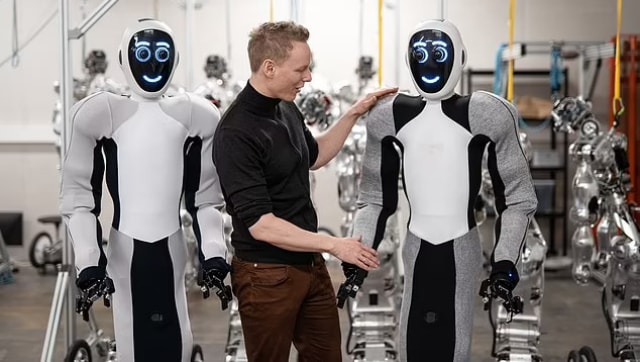
A robotics startup backed by OpenAI, the makers of ChatGPT has beaten Elon Musk’s Tesla in the humanoid robots race, and has successfully deployed humanoid robots as security guards. Next, they will be deploying the robots in hospices and assisted living facilities.
From DSC:
Hmmm…given the crisis of loneliness in the United States, I’m not sure that this type of thing is a good thing. But I’m sure there are those who would argue the other side of this.
Turn ideas into music with MusicLM — from blog.google
Experiment today by describing a musical idea and hearing it come to life.
What new grads can expect as they enter the working world — from mckinsey.com by Patrick Guggenberger, Dana Maor, Michael Park, and Patrick Simon
Excerpt:
May 21, 2023 It’s officially the season of caps, gowns, and stoles—and new grads are gearing up for entry into the world of work at a time when organizations are undergoing massive shifts. “The shifts include complex questions about how to organize for speed to shore up resilience, find the right balance between in-person and remote work models, address employees’ declining mental health, and build new institutional capabilities at a time of rapid technological change, among others,” write Patrick Guggenberger, Dana Maor, Michael Park, and Patrick Simon in a new report. These changes have significant implications for structures, processes, and people. How can new grads set themselves up for success in a quickly evolving environment? If you’re a soon-to-be new grad or know one, check out our newly refreshed special collection for insights and interviews on topics including productivity, hybrid work models, worker preferences, tech trends, and much more.
On a somewhat relevant posting (it has to do with career development as well), also see:
From Basic to Brand: How to Build and Use a Purposeful LinkedIn Profile — from er.educause.edu by Ryan MacTaggart and Laurie Burruss
Developing a professional brand helps higher education professionals establish meaningful work-related connections and build credibility in their area of expertise.
Adobe supercharges Photoshop with Firefly Generative AI — from blog.adobe.com by Pam Clark
Excerpt:
Starting today, Photoshop subscribers can tap into the magic of Firefly, our family of creative generative AI models, directly in the Photoshop desktop (beta) app – using their own, natural language to prompt Photoshop to create extraordinary images with Generative Fill. These prompts can be used to add content, remove or replace parts of an image and extend the edges of an image. Generative Fill is infused into every selection feature in Photoshop, and we have created a new generative layer type so you can work non-destructively. In addition, Generative Fill is also available as a module within the Firefly beta.
Colleges Race to Hire and Build Amid AI ‘Gold Rush’ — from insidehighered.com Susan D’Agostino
Cue the bulldozers to make room for hordes of new AI faculty. But computer scientists willing to teach are in short supply, and innovation’s trajectory is rarely predictable.
Excerpt (emphasis DSC):
The University at Albany, part of the State University of New York, will hire 27 new faculty members—all specializing in AI—in the largest cluster hire in the institution’s history. Purdue University will recruit 50 new AI faculty. Emory University will hire between 60 and 75 new faculty members, including an endowed chair, for its AI Humanity Initiative.
When it comes to artificial intelligence, some universities are going big—very big. The University of Southern California has invested more than $1 billion in its AI initiative that will include 90 new faculty members, a new seven-story building and a new school.
From DSC:
Time will tell whether colleges and universities will be able to find and hire these folks. My guess? For the most part, no they won’t.
Such talent will likely go to deep-pocketed players, startups, and/or new alternatives to institutions of traditional higher education. The disparate salary levels, risk-averse nature, and overall culture of higher education may not be attractive to some of these individuals. Plus, the future of higher education is not looking as solid.
We’re rolling out web browsing and Plugins to all ChatGPT Plus users over the next week! Moving from alpha to beta, they allow ChatGPT to access the internet and to use 70+ third-party plugins. https://t.co/t4syFUj0fL pic.twitter.com/Mw9FMpKq91
— OpenAI (@OpenAI) May 12, 2023
A super-edit video summarizing the full conversation in 27 minutespic.twitter.com/ufzs1oAkSM
1/10
— TuringPost (@TheTuringPost) May 17, 2023
Introducing the ChatGPT app for iOS — from openai.com
The ChatGPT app syncs your conversations, supports voice input, and brings our latest model improvements to your fingertips.
Excerpt:
Since the release of ChatGPT, we’ve heard from users that they love using ChatGPT on the go. Today, we’re launching the ChatGPT app for iOS.
The ChatGPT app is free to use and syncs your history across devices. It also integrates Whisper, our open-source speech-recognition system, enabling voice input. ChatGPT Plus subscribers get exclusive access to GPT-4’s capabilities, early access to features and faster response times, all on iOS.
Spotlight: AI Myths and MisconceptionsYour Undivided Attention — from your-undivided-attention.simplecast.com
A few episodes back, we presented Tristan Harris and Aza Raskin’s talk The AI Dilemma. People inside the companies that are building generative artificial intelligence came to us with their concerns about the rapid pace of deployment and the problems that are emerging as a result. We felt called to lay out the catastrophic risks that AI poses to society and sound the alarm on the need to upgrade our institutions for a post-AI world.
The talk resonated – over 1.6 million people have viewed it on YouTube as of this episode’s release date. The positive reception gives us hope that leaders will be willing to come to the table for a difficult but necessary conversation about AI.
However, now that so many people have watched or listened to the talk, we’ve found that there are some AI myths getting in the way of making progress. On this episode of Your Undivided Attention, we debunk five of those misconceptions.
The State of Voice Technology in 2023 — from deepgram.com; with thanks to The Rundown for this resource
Explore the latest insights on speech AI applications and automatic speech recognition (ASR) across a dozen industries, as seen by 400 business leaders surveyed for this report by Opus Research.
Also relevant here, see:
- Webinar: “The Inside Story: Factors Propelling Speech AI in 2023” — from opusresearch.net
Your guide to AI: May 2023 — from nathanbenaich.substack.com by Nathan Benaich and Othmane Sebbouh
Welcome to the latest issue of your guide to AI, an editorialized newsletter covering key developments in AI research (particularly for this issue!), industry, geopolitics and startups during April 2023.
NYC Public Schools Drop Ban on AI Tool ChatGPT — from bloomberg.com
‘It’s a New Era for Legal Tech’ – Generative AI + The Law — from artificiallawyer.com by Artificial Lawyer (UK) and Dan Katz
A New Dawn of Legal Technology — from globalbankingandfinance.com
Is the legal function finally ready to embrace legal tech and unlock tangible business value?
Excerpt:
In the mid-1980s, a bright red computer terminal that provided lawyers with online access to case law was an iconic status symbol. The UBIQ terminal hooked lawyers up to the Lexis service, at the time one of the first legal technology systems, using full-text search capabilities to provide rapid access to information.
…
It is extraordinary to consider what the legal industry could have achieved if the early adoption of legal tech had not stalled. Sadly, rather than being innovative and embracing the potential of digital records, the industry has underinvested in both legal technology and good data management for the past three decades. Generation after generation of lawyers have failed to take advantage of the power of legal tech to improve client services, reduce risk and enhance efficiency.
Also relevant/see:
- Law Firm Newswire Launches Free AI Press Release Writer for Lawyers — from marketwatch.com
Sam Altman: CEO of OpenAI calls for US to regulate artificial intelligence — from bbc.com by James Clayton
Excerpt:
The creator of advanced chatbot ChatGPT has called on US lawmakers to regulate artificial intelligence (AI). Sam Altman, the CEO of OpenAI, the company behind ChatGPT, testified before a US Senate committee on Tuesday about the possibilities – and pitfalls – of the new technology. In a matter of months, several AI models have entered the market. Mr Altman said a new agency should be formed to license AI companies.
Also related to that item, see:
Why artificial intelligence developers say regulation is needed to keep AI in check — from pbs.org
Excerpt:
Artificial intelligence was a focus on Capitol Hill Tuesday. Many believe AI could revolutionize, and perhaps upend, considerable aspects of our lives. At a Senate hearing, some said AI could be as momentous as the industrial revolution and others warned it’s akin to developing the atomic bomb. William Brangham discussed that with Gary Marcus, who was one of those who testified before the Senate.
We’re rolling out web browsing and Plugins to all ChatGPT Plus users over the next week! Moving from alpha to beta, they allow ChatGPT to access the internet and to use 70+ third-party plugins. https://t.co/t4syFUj0fL pic.twitter.com/Mw9FMpKq91
— OpenAI (@OpenAI) May 12, 2023
Are you ready for the Age of Intelligence? — from linusekenstam.substack.com Linus Ekenstam
Let me walk you through my current thoughts on where we are, and where we are going.
From DSC:
I post this one to relay the exponential pace of change that Linus also thinks we’ve entered, and to present a knowledgeable person’s perspectives on the future.
Catastrophe / Eucatastrophe — from oneusefulthing.org by Ethan Mollick
We have more agency over the future of AI than we think.
Excerpt (emphasis DSC):
Every organizational leader and manager has agency over what they decide to do with AI, just as every teacher and school administrator has agency over how AI will be used in their classrooms. So we need to be having very pragmatic discussions about AI, and we need to have them right now: What do we want our world to look like?
Also relevant/see:
That wasn’t Google I/O — it was Google AI — from technologyreview.com by Mat Honan
If you thought generative AI was a big deal last year, wait until you see what it looks like in products already used by billions.
Google is in trouble.
I got early ‘Alpha’ access to GPT-4 with browsing and ran some tests.
Here are 8 crazy things I found: pic.twitter.com/ndxKGSqlL0
— Rowan Cheung (@rowancheung) May 7, 2023
What Higher Ed Gets Wrong About AI Chatbots — From the Student Perspective — from edsurge.com by Mary Jo Madda (Columnist)
I’m a Student. You Have No Idea How Much We’re Using ChatGPT. — from chronicle.com by
Excerpt:
There’s a remarkable disconnect between how professors and administrators think students use generative AI on written work and how we actually use it. Many assume that if an essay is written with the help of ChatGPT, there will be some sort of evidence — it will have a distinctive “voice,” it won’t make very complex arguments, or it will be written in a way that AI-detection programs will pick up on. Those are dangerous misconceptions. In reality, it’s very easy to use AI to do the lion’s share of the thinking while still submitting work that looks like your own.
The common fear among teachers is that AI is actually writing our essays for us, but that isn’t what happens. You can hand ChatGPT a prompt and ask it for a finished product, but you’ll probably get an essay with a very general claim, middle-school-level sentence structure, and half as many words as you wanted. The more effective, and increasingly popular, strategy is to have the AI walk you through the writing process step by step.
.
From DSC:
The idea of personalized storytelling is highly intriguing to me. If you write a story for someone with their name and character in it, they will likely be even more engaged with the story/content. Our daughter recently did this with a substitute teacher, who she really wanted to thank before she left (for another assignment at another school). I thought it was very creative of her.
How Your Students are Using AI — from drphilippahardman.substack.com by Dr. Philippa Hardman
Excerpts:
Here’s are the five biggest lessons we’ve learned:
-
- Many students are already embracing AI in their day to day study
- Students need AI education, and fast.
- Students have a preference for free or low-cost alternatives to often expensive, paid-for services
- Students find value in personalised, dialogue-based learning experiences
- Ed Tech companies will need to evolve in order to survive.
.
Curricular Resources about AI for Teaching (CRAFT) — from craft.stanford.edu
A project from the Stanford Graduate School of Education
Excerpt:
We’re building resources to teach AI literacies for high school and college instructors and assembling them into a full curriculum that will be deployed in a course with the National Educational Equity Lab offered in Fall 2023.
.
AI video is getting insanely powerful.
Soon, you’ll be able to create a Hollywood-grade movie from your pocket.
Here’s the most breathtaking AI-generated videos I’ve seen:
— The AI Solopreneur (@aisolopreneur) May 11, 2023
ChatGPT has changed the world.
It does lack in some areas, but my favorite use case is leveraging it to teach me things twice as fast.
Here are the 10 best prompts to learn anything faster:
— Rowan Cheung (@rowancheung) May 11, 2023
Why I’m Excited About ChatGPT — from insidehighered.com by Jennie Young
Here are 10 ways ChatGPT will be a boon to first-year writing instruction, Jennie Young writes.
Excerpt:
But from my perspective as a first-year writing program director, I’m excited about how this emerging technology will help students from all kinds of educational backgrounds learn and focus on higher-order thinking skills faster. Here are 10 reasons I’m excited about ChatGPT.
? stfu and take my money
This is the most impressive campaign I’ve seen from a mega brand so far using AI & StableDiffusion.
Would love a breakdown of how this was all done.
— Linus (???) (@LinusEkenstam) May 12, 2023
edX Debuts Two AI-Powered Learning Assistants Built on ChatGPT — from press.edx.org; with thanks to Matthew Tower for this resource
edX plugin launches in ChatGPT plugin store to give users access to content and course discovery
edX Xpert delivers AI-powered learning and customer support within the edX platform
Excerpt:
LANHAM, Md. – May 12, 2023 – edX, a leading global online learning platform from 2U, Inc. (Nasdaq: TWOU), today announced the debut of two AI-powered innovations: the new edX plugin for ChatGPT and edX Xpert, an AI-powered learning assistant on the edX platform. Both tools leverage the technology of AI research and deployment company OpenAI to deliver real-time academic support and course discovery to help learners achieve their goals.
Sam Altman and Greg Brockman on AI and the Future — from open.spotify.com; for education-related discussion go to the 9 minute mark or so
Podcast description:
How might we develop and deploy beneficial, safe artificial general intelligence for humanity? Reid and Aria are joined by Sam Altman, the CEO of OpenAI, and Greg Brockman, OpenAI co-founder and president. Sam and Greg trace their journey—from articulating their mission to early company projects and decisions to scaling and sharing GPT-4 with the world. They also explore the transformative impact artificial intelligence can have on other industries, like energy, medicine, education, and law. Plus, GPT-4 offers a poetic perspective on a piece of code.
.











